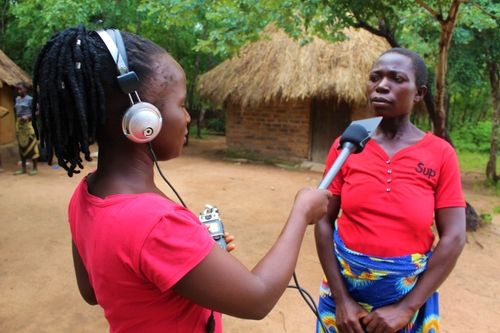By Linda Soko Tembo and Hannock Kasama
Many myths surround the life of journalists. They are supposed to be part of the Fourth Estate, watchdogs of democracy and the rule of law, opinion-makers or gate-keepers. However, less is known about the nature of the journalists.
A MakanDay survey reveals that Zambian journalists face difficult labour conditions, are poorly remunerated, with many of them only able to make it to live the next day.
While salaries in the public media are relatively good, employment opportunities for young reporters are few and those who find jobs are usually placed on short contracts, MakanDay has established.
A 30-year-old journalist who has been working for a Lusaka-based community radio station for over seven years complained about her slave monthly salary of K500. She works twice a week and gets an extra weekly allowance of K100 for transport.
She is not happy with the poor salaries paid to journalists, especially those in the private sector. She says low salaries and poor working conditions have pushed female journalists into white collar prostitution to supplement their income.
“Low salaries in the private media have really contributed to the downfall of professionalism in the journalism fraternity and some remedial measures must be put in place,” she said.
She added: “It’s sad that in some cases, journalists are not entitled to company transport when fetching stories in the field, they survive on transport money from sources.”
A 38-year-old Mazabuka-based journalist Jacob Maambo, said the poor working conditions have driven many journalists out of the profession.
“I have managed to stay in this profession because I hustle, I do not know how I would have been fending for my family had I not been hustling,“ said Mr Maambo.
Although he could not elaborate, in many cases, hustling means journalists turning into public relations (PR) practitioners or taking PR briefs, which is an aberration because one cannot simultaneously be a watchdog and a PR specialist.
In recent years, journalists have increasingly competed to impress politicians who offer them jobs in government, especially the foreign service.
The Media Institute of Southern Africa (MISA), promotes and defends media freedom and freedom of expression across the Southern Africa Development Community (SADC) region.
MISA Zambia has observed that the media industry is among the poorly remunerated sectors in the country.
According to MISA, the situation is worse for community radio stations in rural parts of the country, where journalists literally receive peanuts.
MISA Zambia chairperson Fr Barnabas Simatende says non-payment of journalists’ salaries denies them objectivity and forces them to seek alternative sources of income, thereby compromising media ethics.
“In most cases, journalists have had to rely on transport refunds at media events in order to supplement their meagre pay. This leaves them open to manipulation by desperate selfish people interested only in pushing their agenda,” he says.
Fr Simatende says MISA-Zambia has previously engaged government through the Ministry of Labour and Social Security on the need to revise the pay for journalists and media practitioners to trigger decent salaries.
He urges the government and other stakeholders to continue the process of improving conditions of service for media practitioners.
He also says the profession can thrive if well respected and reclaim its positions as the fourth estate, acting as a watchdog and demanding accountability and transparency from office bearers.
Government’s position Labour Commissioner Givens Muntengwa, says government is aware of the meagre salaries in the media industry, especially in the private sector.
“The panacea for the challenge in the private media lies incoming up with the minimum wage”, he says.
In this regard, there are plans to revise the Minimum Wage and Conditions of Service Act for the media industry.
Mr Muntengwa further says the quest to improve conditions of service in the public media is incumbent on the Labour Union to continue pressing for better wages through negotiations and collective bargaining.
Zambia Congress of Trade Union (ZCTU) Secretary General Cosmas Mukuka echoes the sentiments of the Labour Commissioner and hopes the impending Minimum Wage and Conditions of Service Act will go a long way in ensuring improved conditions of service in the private media.
“Currently journalists in the private media are vulnerable as they are not affiliated to any labour union,” he says.
Media proprietors view
Media proprietors explain that the economic climate is harsh and production costs are usually high.
Diamond TV Chief Executive Officer, Costa Mwansa attributes the low salaries to insufficient revenue flow in the media industry.
Mr Mwansa proposes legal revisions to enforce the payment of content subscription fees by signal distributors like Topstar and Multichoice.
He wondered why the Zambia National Broadcasting Corporation (ZNBC), which receives grants from government and collects TV levy, is allowed to compete with the private media.
“Why must ZNBC TV be permitted to compete on an equal footing with a commercial TV station?”
Hone FM radio station manager Mujinga Phiri told MakanDay, the media has lost much of its revenue to social media.
“Radio stations used to have a lot of advertisements, but individuals nowadays choose to advertise on social media platforms as it is cheaper to do so,” she says.
Independent Broadcasting Authority (IBA) director general Josephine Mapoma says plans are underway to transform TV levy into Broadcasting levy, to enable other broadcasting stations to benefit.
The story was supported by MakanDay Centre for Investigative Journalism and Evelyn Hone College of Applied Arts. It is part of a three-week intensive investigative journalism training organised by the two institutions for Zambian working journalists.
Discover more from MAKANDAY
Subscribe to get the latest posts sent to your email.
